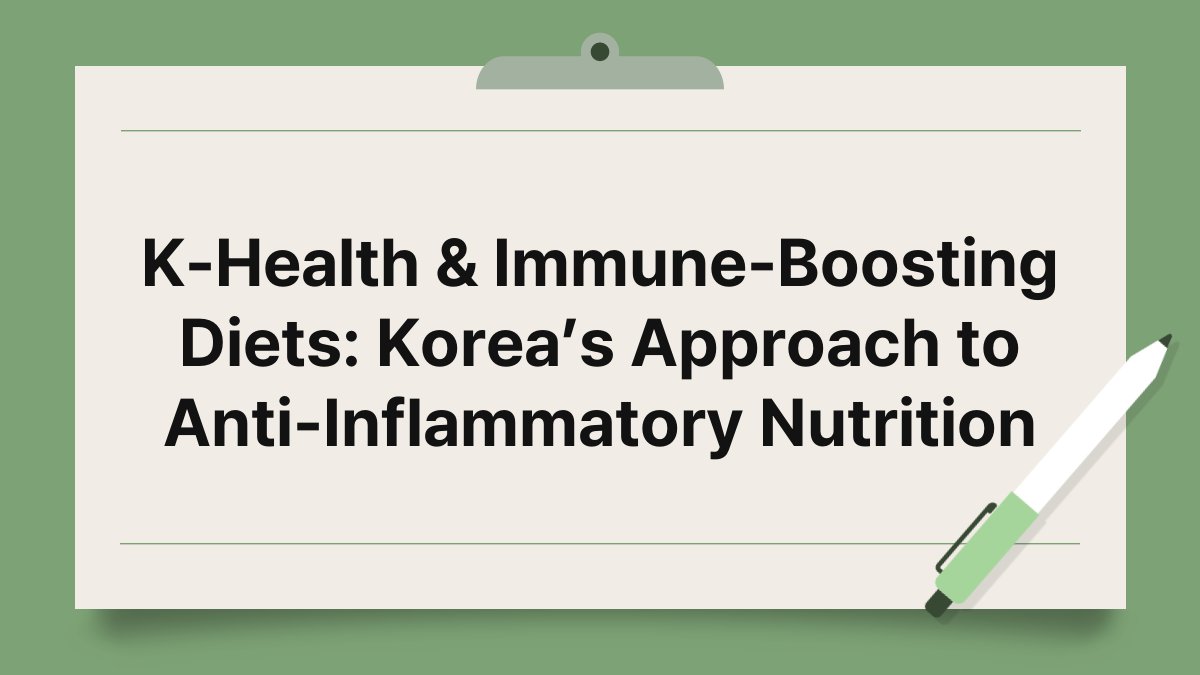[K-Bridge/Samuel] K-Health & Immune-Boosting Diets: Korea’s Approach to Anti-Inflammatory Nutrition encompasses a holistic view of health that integrates traditional dietary practices with modern nutritional science.
This approach emphasizes the importance of food not just for sustenance but as a means to enhance immune function and reduce inflammation.
In Korea, this philosophy is deeply rooted in cultural practices, where meals are often designed to promote overall well-being.
By focusing on nutrient-dense foods, fermented products, and a variety of vegetables, this dietary approach aims to create a balanced lifestyle that supports both physical and mental health.
This article will explore the components of K-Health and immune-boosting diets, their benefits, and how they can be incorporated into daily life.
Understanding K-Health and Its Principles
The Essence of K-Health
K-Health is a comprehensive approach that combines traditional Korean dietary habits with contemporary nutritional insights.
This philosophy revolves around the belief that food plays a crucial role in maintaining health and preventing disease.
Central to K-Health is the idea of balance, where various food groups are consumed in moderation to support overall well-being.
This approach also emphasizes the importance of seasonal ingredients, which are believed to provide the necessary nutrients that align with the body’s needs throughout the year.
Moreover, K-Health encourages mindful eating practices.
This involves not only being aware of what is consumed but also how it is consumed.
Eating slowly and savoring flavors can enhance digestion and promote a more satisfying meal experience.
The integration of traditional cooking methods, such as fermentation, is also a hallmark of K-Health, as these methods are known to enhance the bioavailability of nutrients and promote gut health.
The Role of Anti-Inflammatory Nutrition
Anti-inflammatory nutrition is a critical component of K-Health, focusing on foods that help reduce inflammation in the body.
Chronic inflammation is linked to various health issues, including heart disease, diabetes, and autoimmune disorders.
By incorporating anti-inflammatory foods into the diet, individuals can potentially mitigate these risks.
Foods rich in antioxidants, omega-3 fatty acids, and fiber are particularly emphasized in this context.
Korean cuisine naturally aligns with anti-inflammatory principles, featuring a variety of vegetables, whole grains, and fermented foods.
Ingredients such as garlic, ginger, and turmeric are commonly used for their anti-inflammatory properties.
Additionally, the use of kimchi, a staple in Korean diets, is celebrated for its probiotic benefits, which support gut health and immune function.
Overall, understanding the role of anti-inflammatory nutrition is essential for anyone looking to adopt a K-Health lifestyle.
Cultural Significance of K-Health
The cultural significance of K-Health cannot be understated.
In Korea, food is not merely a means of survival; it is a vital part of social interactions and cultural identity.
Traditional meals are often shared among family and friends, enhancing social bonds and emotional well-being.
This communal aspect of eating reinforces the idea that health is not just an individual pursuit but a collective responsibility.
Furthermore, K-Health reflects the wisdom of generations, where dietary practices have been passed down and refined over time.
These practices are often rooted in the natural environment, utilizing locally sourced ingredients that are in season.
This not only supports sustainability but also fosters a deeper connection to the land and its resources.
By understanding the cultural significance of K-Health, individuals can appreciate the holistic nature of this dietary approach.
Key Components of Immune-Boosting Diets
Nutrient-Dense Foods
Nutrient-dense foods are the cornerstone of immune-boosting diets.
These foods provide a high amount of vitamins, minerals, and antioxidants relative to their caloric content.
In the context of K-Health, a variety of colorful vegetables, fruits, whole grains, and lean proteins are emphasized.
For instance, leafy greens such as spinach and kale are rich in vitamins A, C, and K, which play a crucial role in immune function.
Fruits like berries and citrus are also celebrated for their high antioxidant content, which helps combat oxidative stress and inflammation.
Whole grains, such as brown rice and barley, provide essential nutrients and fiber that support digestive health.
By prioritizing nutrient-dense foods, individuals can enhance their immune response and overall health.
Fermented Foods and Gut Health
Fermented foods are a vital aspect of K-Health, particularly for their role in gut health and immune function.
The fermentation process enhances the bioavailability of nutrients and introduces beneficial probiotics, which support a healthy gut microbiome.
Foods like kimchi, miso, and fermented soy products are staples in Korean cuisine and are known for their probiotic content.
A healthy gut microbiome is essential for a robust immune system, as it helps regulate immune responses and reduces inflammation.
Consuming a variety of fermented foods can promote diversity in gut bacteria, which is linked to improved health outcomes.
Therefore, incorporating fermented foods into the diet is a key strategy for enhancing immune health within the K-Health framework.
The Importance of Hydration
Hydration is often overlooked in discussions about nutrition, yet it plays a critical role in immune function and overall health.
In the context of K-Health, traditional Korean beverages such as barley tea and various herbal teas are commonly consumed.
These drinks not only hydrate but also provide additional health benefits through their antioxidant properties.
Adequate hydration supports digestion, nutrient absorption, and the elimination of toxins from the body.
It also helps maintain optimal physiological functions, including temperature regulation and joint lubrication.
By prioritizing hydration, individuals can enhance their immune response and support overall well-being.
Traditional Korean Ingredients for Immune Support
Garlic and Its Benefits
Garlic is a staple ingredient in Korean cooking, celebrated for its numerous health benefits.
It contains compounds like allicin, which possess potent anti-inflammatory and antimicrobial properties.
Incorporating garlic into daily meals can help bolster the immune system and reduce the risk of infections.
In addition to its immune-boosting properties, garlic is known to support cardiovascular health by promoting healthy blood circulation and reducing cholesterol levels.
Its versatility in cooking allows for easy incorporation into various dishes, from stir-fries to soups, making it an essential component of a K-Health diet.
Ginseng: A Natural Adaptogen
Ginseng is another traditional ingredient that plays a significant role in Korean health practices.
Known for its adaptogenic properties, ginseng helps the body adapt to stress and enhances overall vitality.
It is believed to improve immune function and increase energy levels, making it a popular choice for those seeking to boost their health.
Ginseng can be consumed in various forms, including teas, powders, and extracts.
Its unique flavor and health benefits make it a valuable addition to a K-Health diet.
Regular consumption of ginseng may lead to improved physical and mental well-being, further supporting the principles of K-Health.
Seaweed: A Nutrient Powerhouse
Seaweed is a nutrient-dense food that is commonly used in Korean cuisine.
It is rich in vitamins, minerals, and antioxidants, making it an excellent choice for immune support.
Seaweed is particularly high in iodine, which is essential for thyroid health and metabolic function.
In addition to its nutritional benefits, seaweed is also known for its anti-inflammatory properties.
Incorporating various types of seaweed, such as kelp and nori, into meals can enhance flavor while providing a wealth of nutrients.
This makes seaweed a valuable addition to the K-Health and immune-boosting dietary approach.
Meal Planning for Immune Health
Creating Balanced Meals
Creating balanced meals is essential for supporting immune health.
A typical K-Health meal should include a variety of food groups, ensuring that individuals receive a wide range of nutrients.
This involves incorporating lean proteins, whole grains, healthy fats, and plenty of vegetables.
For instance, a well-balanced Korean meal might consist of grilled fish, brown rice, and a side of mixed vegetables stir-fried with garlic.
This combination provides essential nutrients while promoting a satisfying and flavorful dining experience.
By focusing on balance, individuals can enhance their immune response and overall well-being.
Incorporating Seasonal Ingredients
Seasonal ingredients are a hallmark of K-Health, as they align with the natural cycles of the environment.
Incorporating seasonal produce into meal planning not only supports sustainability but also ensures that individuals receive the freshest and most nutrient-rich foods available.
For example, during the spring, incorporating ingredients like asparagus and radishes can provide essential vitamins and minerals.
In the fall, root vegetables such as sweet potatoes and carrots can be featured for their nutritional benefits.
By embracing seasonal ingredients, individuals can enhance their K-Health meals while supporting their immune system.
Meal Prep Strategies
Meal prep is an effective strategy for maintaining a K-Health and immune-boosting diet.
Preparing meals in advance allows individuals to have healthy options readily available, reducing the temptation to opt for processed foods.
This can involve batch cooking grains, roasting vegetables, and preparing proteins to be used throughout the week.
Additionally, incorporating a variety of flavors and textures can make meal prep more enjoyable.
For instance, preparing a large batch of kimchi can add a probiotic-rich side to meals, while marinating proteins in garlic and ginger can enhance flavor and health benefits.
By implementing meal prep strategies, individuals can simplify their journey toward a healthier lifestyle.
Lifestyle Practices to Enhance Immune Function
Regular Physical Activity
Regular physical activity is a crucial aspect of maintaining immune health.
Engaging in consistent exercise not only supports physical fitness but also has positive effects on the immune system.
Activities such as walking, yoga, and strength training can enhance circulation and promote overall well-being.
Incorporating exercise into daily routines can be as simple as taking a brisk walk or participating in group classes.
The key is to find activities that are enjoyable and sustainable, allowing individuals to stay motivated.
By prioritizing physical activity, individuals can significantly enhance their immune function and overall health.
Stress Management Techniques
Stress management is essential for maintaining a healthy immune system.
Chronic stress can lead to increased inflammation and a weakened immune response.
Therefore, incorporating stress-reducing practices into daily life is vital for overall well-being.
Techniques such as mindfulness meditation, deep breathing exercises, and spending time in nature can help alleviate stress.
Additionally, engaging in hobbies and activities that bring joy can provide a sense of balance and relaxation.
By prioritizing stress management, individuals can support their immune health and enhance their quality of life.
Quality Sleep
Quality sleep is often overlooked but is critical for immune function.
During sleep, the body undergoes various restorative processes that help regulate immune responses.
Establishing a consistent sleep schedule and creating a conducive sleep environment can significantly improve sleep quality.
Practices such as limiting screen time before bed, creating a calming bedtime routine, and ensuring a comfortable sleep environment can promote restful sleep.
By prioritizing quality sleep, individuals can enhance their immune system and overall health, aligning with the principles of K-Health.
Conclusion
K-Health & Immune-Boosting Diets: Korea’s Approach to Anti-Inflammatory Nutrition offers a comprehensive framework for enhancing health and well-being.
By understanding the principles of K-Health, incorporating nutrient-dense foods, and adopting lifestyle practices that support immune function, individuals can take proactive steps toward better health.
Embracing this holistic approach not only promotes physical health but also nurtures mental and emotional well-being.
Ultimately, the journey toward improved health through K-Health is a rewarding endeavor that fosters a deeper connection to food, culture, and community.








